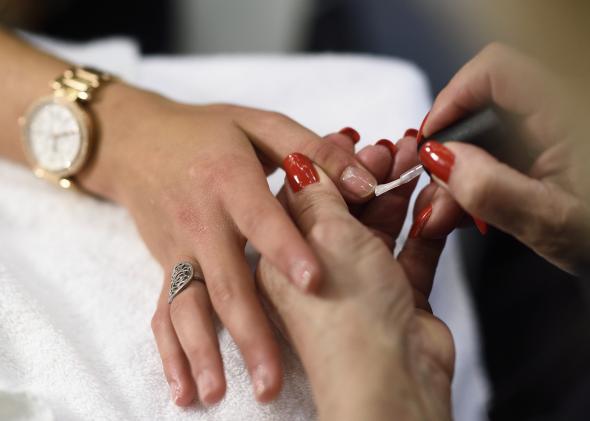The New York Times’ deeply disturbing investigation into how many of the city’s ubiquitous nail salons exploit their immigrant employees seems to have prompted a well-meaning but ultimately misguided reaction among some readers. As reporter Sarah Maslin Nir writes, manicurists in and around New York—typically young Korean, Chinese, or Hispanic women, many of whom speak little to no English and are undocumented immigrants—are regularly forced to work 10- to 12-hour shifts for $30 or $40 a day. Owners, typically Korean immigrants themselves, regularly charge new hires a $100 “fee” for their new job, then require them to work unpaid, except for tips, in a sort of apprenticeship until they are supposedly worthy of a wage. If you’ve ever wondered how getting one’s nails polished and primped in Manhattan can cost just $10.50—less than the cost of a meal at Shake Shack—well, there it is.*
In retrospect, none of this should be especially surprising.1 As a rule, if you are paying an immigrant who can’t speak English a vanishingly small sum in order to perform a labor-intensive service, there is a strong chance that something isn’t above board in the transaction and that some degree of human trafficking or wage violations might be involved. But in any event, a number of people on Twitter are now urging their followers to do the seemingly obvious to assuage their guilt: If they must get their nails done, tip better.
Sadly, I don’t think that tipping more generously is the solution here, most obviously because manicurists won’t necessarily get to keep the money. Nir writes as much in the piece: “Salon workers describe a culture of subservience that extends far beyond the pampering of customers. Tips or wages are often skimmed or never delivered, or deducted as punishment for things like spilled bottles of polish.” (Emphasis mine.) Now, if I were an unscrupulous nail salon owner, and I saw that there was suddenly a huge amount of money flowing into my business in the form of gratuities, I’d probably be tempted to do a bit more skimming. Maybe I’d let my workers keep a bit more cash in the end. Maybe not.
So how can customers go about getting their fingernails varnished ethically? Well, one approach would be to avoid businesses that are primarily staffed by vulnerable immigrants. There are downsides to this. First, it will obviously cost you more to go somewhere that employs less easily exploited staff. Second, it feels extremely xenophobic—you’d basically be vowing to avoid Korean businesses. Third, by not patronizing your former favorite salon, you’re more or less guaranteeing that its employees earn even less.
And of course, it’s not clear that your personal decision to boycott will make much of a difference. The New York Times has a lot of readers who are prone to liberal guilt. But New York City has even more people who like a bargain on personal grooming. Without some sort of organized effort to avoid whichever salons might be breaking the law, you’re probably looking at an insurmountable collective-action problem.
Theoretically, that’s why we have labor laws in the first place—because the market on its own isn’t going to protect people who can’t protect themselves. Unfortunately, as Nir writes, the people in charge of policing New York’s workplaces are woefully under-resourced. To wit:
Among the Labor Department’s 115 investigators statewide — 56 are based in New York City — 18 speak Spanish and 8 speak Chinese, essential tools for questioning immigrant workers to uncover whether they are being exploited. But just two speak Korean, according to the department. Department officials say all of their inspectors have access to interpreting services.
So if you’re really feeling torn up about the fact that the woman painting your nails is being exploited, consider asking your state legislator to properly fund the state labor department so that it has enough manpower to look into these abuses. Remember, there are similar problems across all sorts of industries, especially restaurants. (The poor guy delivering your Chinese food through the rain? There’s a strong chance he’s living off nothing but tips, as well). Leaving your manicurist an extra $5 isn’t going to solve them.
1 That isn’t to minimize the NYT’s awesome work on this piece. Lots of things that in hindsight should have been obvious aren’t until somebody does the hard work of pointing them out.
*Correction May 7, 2015: In a sad fit of male ignorance, I incorrectly wrote that the cost of a mani-pedi in Manhattan was $10.50. That’s a typical cost for a manicure. Getting both your toes and fingers done would cost more.
